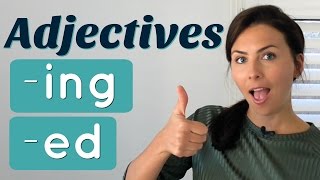Hello! I'm Emma from mmmEnglish and in this lesson we're focusing on adjectives.
你好!我是来自mmmEnglish的Emma,这节课我们将关注形容词。
But not just any adjectives!
但不是任何形容词!
Pairs of adjectives that can end in either ED or ING,
而是以ED或ING结尾的形容词对,
because you might be a little confused about when you can use each type of adjective!
因为你可能会对什么时候可以使用每种类型的形容词感到有点困惑!
Lots of these english adjectives are made by adding ED or ING to a verb.
很多英语形容词都是通过在动词后面加ED或ING来构成的。
For example, the verb 'frustrate' can become an adjective by adding ED - 'frustrated' or ING 'frustrating'.
例如,动词“frustrate”可以通过添加ED -“”或ING“”成为形容词。
These endings are called suffixes and when we add them to the end of a verb they transform our verb into an adjective.
这些被称为后缀,当我们把它们加到动词后面时,它们就把动词变成了形容词。
But you need to know how to use each of these types of adjectives
但是你需要知道如何使用这些类型的形容词,
and we're going to do that right now, right here in this lesson!
我们马上就来做,就在这节课!
An adjective that ends in ING is used to describe the characteristics of something the characteristics of a person or a place or a thing or a situation.
一个以ING结尾的形容词用来描述某事物的特征,一个人、一个地方、一件事或一个情况的特征。
Adjectives that end in ED are used to describe an emotion or a feeling and it's usually a temporary thing something that only people can have generally, only people have feelings, most of the time.
以ED结尾的形容词是用来描述一种情感或感觉的,它通常是一种暂时的东西,通常只有人能拥有,大多数情况下,只形容人的感觉。
But some animals can also have feelings.
但是有些动物也有感情。
But you can't use ED adjectives to describe the feelings of a thing or of the situation because they don't have feelings!
但是你不能用ED形容词来描述事物或情况的感觉,因为它们没有感觉!
If you say that something or someone is boring, they or it makes you feel bored.
如果你说某事或某人无聊用boring,他们或它让你觉得无聊用bored。
So, the thing or the person that is boring is what makes you feel bored.
所以,让你感到boring的事情或人就是让你感到bored的人。
It bores you OK, there's our verb!
也可以说It bores you,此时是动词!
If you say that something is exciting, it makes you feel excited.
如果你说某事令人兴奋用exciting,它会让你感到兴奋用excited。
Did you did you notice any patterns in those examples?
你注意到这些例子中的模式了吗?
If you're talking about a temporary feeling or an emotion then use the ED form of the adjective.
如果你谈论的是一种暂时的感觉或情绪,那么就用形容词的ED形式。
If you're describing the thing or the person that caused those feelings, then use the ING form of the verb.
如果你在描述引起这些感觉的事物或人,那么使用动词的ING形式。
For example, that movie was strange!
例如,那部电影很奇怪!
Let's look at the difference again.
让我们再来看看区别。
He's bored.
他感到无聊用bored。
So, he's not interested in what's happening, he's not having a good time.
所以,他对正在发生的事情不感兴趣interested,他过得不开心。
If he's at a party perhaps he doesn't like the music
如果他在派对上,也许他不喜欢音乐,
or he doesn't really know anyone and he's got no one to talk to.
或者他不认识任何人,没有人可以交谈。
He's bored.
他感到无聊用bored
He feels bored.
He feels bored用bored.
But if you say he's boring it means he's not an interesting person, that you don't enjoy talking to him.
但是如果你说他很无聊boring,这意味着他不是一个有趣的人,你不喜欢和他说话。
He's never got anything interesting to say.
他从来没有什么有趣的事可说。
He's boring.
他很无趣用boring。
He makes me feel bored.
他让我觉得很无聊用bored。
Alright, it's time to practice a little now.
好了,现在是时候练习一下了。
I'm going to read out a few sentences for you and I want you to try to choose if the adjective in each sentence is the correct adjective or not.
我将为你们读几个句子,我希望你们试着选择每个句子中的形容词是否是正确的形容词。
Ready?
准备好了吗?

What do you think?
你觉得如何?
It's a “no”!
回答是“不”!
Incorrect answer!
错误的回答!
I am very excited to see my sister.
我很高兴见到我的妹妹。
It's how I feel.
这就是我的感觉。
I'm excited.
我感到很兴奋用excited。
I feel excited to see my sister.
见到妹妹我感到很兴奋用excited。
annoying I don't understand these Correct!
真烦人,我不明白这些对不对!用annoying
The instructions are annoying.
说明书真烦人用annoying。
They're making me feel annoyed.
他们让我觉得很烦用annoyed。
I'm bored because i've got nothing to do.
我很无聊,因为我无事可做用bored。
I feel bored.
我觉得很无聊用bored。
I felt so embarrassed!
我觉得很尴尬用embarrassed!
I felt embarrassed when I spilt tomato sauce down my dress on a date!
有一次约会,我把番茄酱洒在裙子上了,我觉得很尴尬!用embarrassed。
I hate being the centre of attention!
我讨厌成为大家注意的中心!
It was so embarrassing when they called my name and I had to go up on stage!
当他们叫我的名字时,我不得不走上舞台,这真是太尴尬了!用embarrassing。
It was embarrassing.
这是令人尴尬的。用embarrassing。
The experience was embarrassing.
这种经历令人尴尬。用embarrassing。
I felt embarrassed.
我感到尴尬。用embarrassed。
OK, I've made a worksheet for you
好的,我已经为你做了一个工作表,
so you can keep practicing these adjectives after this lesson finishes you can download it for free right here!
所以你可以在这节课结束后继续练习这些形容词,你可以在这里免费下载!
I want you to practice using these adjectives when you're speaking when you're writing and when you're listening to other people.
我想让你在说话、写作和听别人说话的时候练习使用这些形容词。
Listen to how they used.
听听他们是如何使用的。
I'm also going to send you the answers to the worksheet
我也会把答案发给你们,
so that you know what you got right what you need to improve.
这样你们就知道自己做对了什么,还有什么需要改进的地方。
I hope that you enjoyed this lesson
我希望你喜欢这节课,
and if you are a subscriber to the mmmEnglish Channel, it's awesome to see you again!
如果你是mmmEnglish频道的订户,很高兴再次见到你!
If you are not a subscriber yet then just click that red button right there and join me for the next lesson.
如果你还没有订阅,那就点击那里的红色按钮,加入我的下一课。
You can also find me on Facebook.
你也可以在Facebook上找到我。
You can check out some of my other videos right here,
你可以看看我其他的一些视频,
especially this one, my imitation lessons, which are a really fun and easy way to practice your English speaking skills.
尤其是这个,我的模仿课,这是一个用来练习英语口语技能非常有趣和简单的方法。
That's all from me today!
今天就到这里吧!
I'm glad you joined me and I'll see you next time.
很高兴你加入我,下次再见。
Bye for now!
再见!












